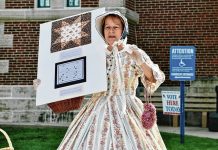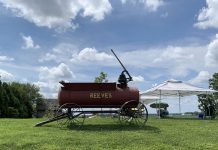Columbus Area Chamber of Commerce opened its new makerspace Columbus Propeller Community Innovation Center to visitors on Thursday, where businessmen, educators, community leaders and self-proclaimed tinkerers received a preview of the new facility.
The preview and networking event Thursday night attracted about 100 people, said Chamber of Commerce President Cindy Frey. Chamber officials said 86 people pre-registered to attend.
And as noted by Propeller board member Michael Baker said, visitors who came out to see the space represented varied interests and backgrounds.
The Propeller innovation center or “makerspace” is supported by chamber and other local organizations. It is located in two buildings that were recently vacated by Cummins, which had used the space for testing engines.
Propeller previewed equipment in the new makerspace, including 3-D printers, laser cutters and screen printing. Makers helped visitors create challenge coins and posters while also demonstrating other fabricated pieces. Organizers gave tours of the space, and visitors chatted and networked over refreshments as they took it all in.
Preliminary maps of the space include areas for electronics, demonstration, staging, robotics, entrepreneurial tenants, metalwork, collaboration, 3-D printing and prototyping, and crafts such as sewing and woodworking.
“It’s really kind of a blank canvas right now, and we’re building it out,” said Frey.
The event included a whiteboard where guests could write what they’d like to see in the space.
Responses included a coding class, a paint booth, long-arm quilting, machine embroidery and a sewing machine.
While the makerspace isn’t finished yet, Columbus Municipal Airport Director Brian Payne said he’s happy with what’s been accomplished so far on the AirPark campus with the two buildings. When Cummins was still in the space, it was full of engines and other items. At that time, it was difficult to see “the vision of what could be,” he said.
However, now that the space has been cleaned out and mapped, that’s beginning to change.
“It’s really easy to see that we have an opportunity here to do something great for Columbus,” Payne said.
John McDaniel, a tour guide who used to work in the space when it was leased to Cummins, said that the company did a good job clearing out the buildings for Propeller.
Propeller President Bryan Rushton said that during the pandemic, it was sometimes hard to know how much the community was invested in the project — which made Thursday’s turnout encouraging to organizers.
“I’m loving what I’m seeing,” said Propeller board member and Ivy Tech Chancellor Steven Combs. Combs, who is himself a maker, had not visited the space since Cummins moved out.
He noted that the turnout was amazing and cited volunteers’ work on the C-119 project in Propeller’s metal shop as a perfect example of something the makerspace can facilitate.
Maker and volunteer Matthew Rust, who helped visitors print Propeller posters, said that while he’s spent a lot of money on tools, that can be an obstacle for a lot of people, so it’s “awesome” to have a space where makers can have access to equipment.
For McDaniel, Propeller’s major appeal is the opportunity to meet other “tinkerers.” For instance, he connected with one attendee, Jamie Copeland, over their mutual interest in ham radio.
A makerspace can be a place where people get excited and influenced by each other’s projects, said Copeland, who was involved with the LVL1 “hackerspace” when he lived in Louisville.
“It’s kind of inspiring just to see what other people are tinkering in,” he said.
McDaniel joked that even if the other people at the makerspace don’t always have the answer to your problem, they can help you “minimize your mistakes.”
He added that he hopes Propeller will inspire young people to get into making and building things, reactivating a mentality that he feels has perhaps waned over time.
“I think a lot of the ‘make-it-yourself’ has died off,” he said.
Propeller is proposing to have a paid membership model, similar to that of a gym, as well as family and corporate memberships. Some spaces could be sub-leased to start-up companies. Local higher learning institutions on the Airpark campus are also considering covering membership costs for interested students.
However, it will be at least a few months before the makerspace is officially open, as it is itself a work in progress.
“Once we can get equipment in and the construction largely completed, we will work to start ramping up,” organizers said. “Our best guess (for opening) right now is around January, though we will be having several events and possibly some classes as we can.”
Work items still underway include resurfacing, relocating AC units, adding personal doors for safety and upgrading windows “for better efficiency.”




